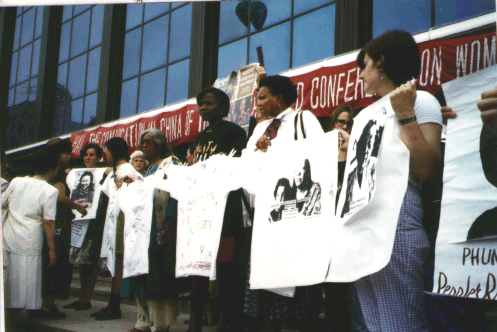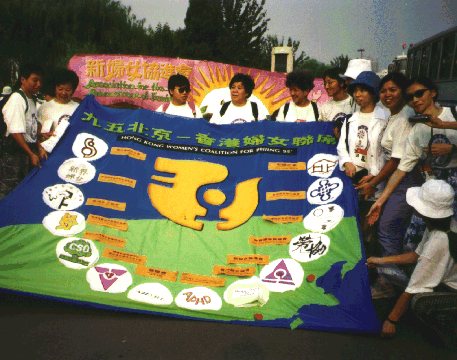 No retreats,
no regrets
No retreats,
no regretsFeminists see long, winding road to sexual equality


 No retreats,
no regrets
No retreats,
no regrets
Feminists see long, winding
road to sexual equality
Fourteen local women’s groups united to form the Hong Kong Women’s Coalition and sent their representatives to the conference.
Among them was Ms Wu Mei Lin, the chairperson of The Hong Kong Women’s Workers Association, formed in 1989.
The aim if the association is to unite female workers to fight for their rights and enhance their self-development.
It also tries to put women’s needs and problems on the public agenda.
According to Ms Wu, the association joined workshops and shared experiences with women from other countries in forming cooperative societies.
“We can make use of the experiences and ideas of feminist groups in other places and apply them to the similar situation here,” said Ms Wu.
The Association for the Advancement of Feminism, which aims at promoting sexual equality in Hong Kong, also joined the conference.
Through joining the conference, the chairperson of the association, Lily Lau Lee Lee, found that feminism was still in its infancy in Hong Kong:
“Many overseas feminists, like those from Australia, are older and more experienced than us.
“Overseas feminist groups are specific organizations, like organizations for lesbians, housewives, economic development and many others.
“They have tried various ways like singing, dancing and even circuit shows to arouse attention.
“Feminism should be anti-hierarchical — that is, there should be no leader and the participation of everyone is viewed as equally important,” she said.
Although the international conference declared “women” as an important agenda item, local feminists claim that many difficulties confronting women have not gained enough attention yet.
 Recently, the “Green Paper on Equal Opportunities for Women and Men” was announced by
the government.
Recently, the “Green Paper on Equal Opportunities for Women and Men” was announced by
the government.
“The Green Paper reflects the change of the government’s attitude by admitting the existence of sexual inequality,” said Miss Lau.
However, both Ms Wu and Miss Lau suspected the effectiveness of the Green Paper.
“The problem of discrimination is not solved because there are still loopholes for those to escape from responsibilities.
“Whatever, the Green Paper is essential,” said Ms Wu.
 Above: Hong Kong Women's Coalition for Beijing '95
Above: Hong Kong Women's Coalition for Beijing '95
Ms Emily Lau Wai Hing, a legislative councillor, said that many amendments have to be made concerning the Green Paper.
“Without cultural acknowledgement, law cannot be practised effectively -- this is a good lesson to learn,” said she.
In the Legislative Council, women are still a minority group, but Ms Emily Lau seems to have taken this in stride:
“I never regard myself as female councillor; instead, I am a legislative councillor. The same work has to be done, no matter whether you are a male or a female.”
Apart from the Green Paper, the New Territories Ordinance is also a controversial issue about gender.
Although inheritance rights issues seem to have been resolved, women in traditional villages are still being exploited by the Ordinance.
Despite facing inequalities, some village women oppose further amendment of the Ordinance.
It was said that they were afraid of the loss of traditional culture, and this is a great obstacle to feminists.
“Because of socialization, village women dare not work against their fathers or clans.
“A sound legal system is important to back up the village women. Therefore, the preliminary work is legislation,” Miss Lily Lau suggested.
Concerning social welfare, full-paid maternity leave is one of the focuses.
“There is a large gap between earnings of employers and of employees, and companies are totally capable of providing full-paid maternity leave,” said Miss Lily Lau.
Miss Mok Miu Ying from the same association Ms Wu chairs highlighted another difficulty faced by married women who have children.
She pointed out the need for more supporting services like child-care centres so that the women can go to work and develop their abilities.
Concerning going out to work, unemployment is another serious problem women have to face.
According to Miss Mok, there has been the problem ever since the mid-1980s.
In most cases, women are the first to be fired whenever companies want to cut expenses.
“At the beginning, these unemployed women could still find harsh jobs in tough environment. For example, they have had to work more than 18 hours a day without sick leave or paid leave.
“However, they still end up losing their jobs, “ said Miss Mok.
Women were still unable to get others’ recognition of their abilities other than doing housework, giving a blow to their confidence.
Both Miss Wu and Miss Lily Lau claimed that issues like age discrimination had successfully aroused public awareness.
Other than unemployment, age discrimination and educational restrictions also pose obstacles to women.
“Females aged over 30 find difficulties in finding jobs. Even if they can, conditions are harsh — usually, the older the age, the lower the salaries.
“Many companies, especially those providing services, only employ young ladies for the sake of company’s image. In this case, those young ladies are only their commercial goods,” said Miss Mok.
As for educational restrictions, women over 30 are greatly affected since most of them have never received free education in the past.
“However, some work like cleaning services, do not need high level of education but skills.
“The emphasis on educational levels leads to the denial of their abilities also,” Miss Mok argued.
Dealing with it, Miss Mok’s association has set up an action group to work for equal job opportunities.
The group concentrates in the fight against age discrimination, ineffective legislation and other inequalities faced by women.
Meanwhile, mass media might be blamed for stereotyping the humiliating roles of women.
For example, the sexy women appearing recently in two televised beer advertisements aroused strong objections because the content was thought to be sexually discriminating against women.
“The media professionals have to be self-disciplined. It is no good to control them by law since this will restrict the freedom of creativity,” said Ms Emily Lau.
Miss Lily Lau pointed out that the media personnel usually ignore sexism, while others ideas like racism seem to be viewed as much more important.
Although many activists work hard for sexual equality, their main difficulties are the passiveness of females and ignorance of the community.
“The ignorance about sexual inequalities is a result of misconceptions.
“Some even argue that males and females can never be equal because of biological differences.
“Many Hong Kong people consider that the condition of sexual equality is better than that of other countries, and hence little attention is paid to sexual inequality,” said Miss Lily Lau.
“The solution is to speak out and have strong will,” said Miss Lily Lau.
Ms Emily Lau said that the infiltration of feminist ideology and work into society is not deep enough, so they lack support from both sexes.
Nevertheless, Miss Wu held a different idea.
She argued that the degree of infiltration is hard to measure.
Many females cannot join feminist movements just because of reasons like pressures from family and working.
Miss Lily Lau also worried about the increasing pressure from the Chinese government after 1997.
“Gender equality is part of human rights, and so the success of feminism needs a democratic institution,” she said.
On the other hand, Miss Lily Lau thought the political change may give more stimulation to feminism as “the greater the pressure, the stronger the opposition”.
Concerning the future of the feminist movement in Hong Kong, Miss Wu insisted one must work for feminism no matter how big the challenge is.


